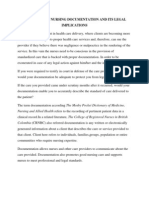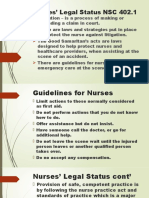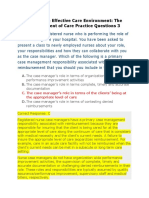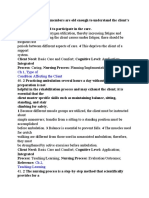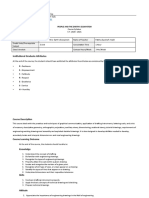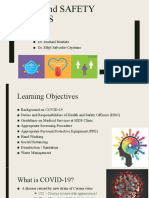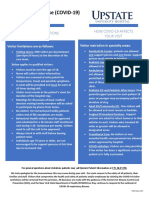Professional Documents
Culture Documents
CH 2, Torts and Crimes Important To Nurses
CH 2, Torts and Crimes Important To Nurses
Uploaded by
AMIR LADJA0 ratings0% found this document useful (0 votes)
29 views2 pagesThis document discusses client rights and informed consent in healthcare. It provides several scenarios and evaluates nursing responses regarding explaining treatment to clients, assessing a client's understanding before a medical procedure, and obtaining proper consent including from family if a client is unconscious. The overall focus is on a nurse's responsibility to ensure informed consent and respect a client's rights in different clinical situations.
Original Description:
1.2
Original Title
np2
Copyright
© © All Rights Reserved
Available Formats
DOCX, PDF, TXT or read online from Scribd
Share this document
Did you find this document useful?
Is this content inappropriate?
Report this DocumentThis document discusses client rights and informed consent in healthcare. It provides several scenarios and evaluates nursing responses regarding explaining treatment to clients, assessing a client's understanding before a medical procedure, and obtaining proper consent including from family if a client is unconscious. The overall focus is on a nurse's responsibility to ensure informed consent and respect a client's rights in different clinical situations.
Copyright:
© All Rights Reserved
Available Formats
Download as DOCX, PDF, TXT or read online from Scribd
Download as docx, pdf, or txt
0 ratings0% found this document useful (0 votes)
29 views2 pagesCH 2, Torts and Crimes Important To Nurses
CH 2, Torts and Crimes Important To Nurses
Uploaded by
AMIR LADJAThis document discusses client rights and informed consent in healthcare. It provides several scenarios and evaluates nursing responses regarding explaining treatment to clients, assessing a client's understanding before a medical procedure, and obtaining proper consent including from family if a client is unconscious. The overall focus is on a nurse's responsibility to ensure informed consent and respect a client's rights in different clinical situations.
Copyright:
© All Rights Reserved
Available Formats
Download as DOCX, PDF, TXT or read online from Scribd
Download as docx, pdf, or txt
You are on page 1of 2
other children. 4 A child should never be isolated.
Client Need: Management of Care; Cognitive Level: Application; Nursing
Process:
Evaluation/Outcomes; Reference: Ch 2, Torts and Crimes Important to
Nurses
23. 3 The client’s rights have been violated. All clients have the right to a
complete and
accurate explanation of treatment based on cognitive ability.
1 All interventions should be explained because they are not routine to the
client. 2 When administering treatment, the nurse is responsible for
explaining what
the treatment is and why it is being given. 4 The Patient Care Partnership
(The
Patient’s Bill of Rights) states that the client should be informed.
Client Need: Management of Care; Cognitive Level: Comprehension;
Nursing Process:
Evaluation/Outcomes; Reference: Ch 2, Clients’ Rights
24. 4 Informed consent means the client must comprehend the surgery,
the alternatives,
and the consequences.
1 This description is not within nursing’s domain. 2 Although this is true, it
does not
determine the client’s ability to give informed consent. 3 Although this is
true, the
nurse should first assess the client’s knowledge of the surgery.
Client Need: Management of Care; Cognitive Level: Application;
Integrated Process:
Communication/Documentation; Nursing Process: Evaluation/Outcomes;
Reference:
Ch 2, Clients’ Rights
25. 4 Although a hysterectomy may be performed, conservative
management may
include cervical conization and laser treatment that do not preclude
future pregnancies;
clients have a right to be informed by their health care provider of all
treatment options.
1 This currently is not the issue for this client. 2, 3 This negates the client’s
feelings.
Client Need: Management of Care; Cognitive Level: Application;
Integrated Process:
Communication/Documentation; Nursing Process:
Planning/Implementation;
Reference: Ch 2, Clients’ Rights
26. 3 This is considered a routine procedure to meet basic physiologic
needs and is
covered by a consent signed at the time of admission.
1 The need for consent is not negated because the procedure is beneficial. 2,
4 This
treatment does not require special consent.
Client Need: Management of Care; Cognitive Level: Analysis; Integrated
Process:
Communication/Documentation; Nursing Process: Evaluation/Outcomes;
Reference:
Ch 2, Clients’ Rights
27. 4 The client is unconscious. Although the spouse can give consent,
there is no legal
power to refuse a treatment for the client unless previously authorized to
do so by a
power of attorney or a health care proxy; the court can make a decision
for the client.
1, 3 This alternative is without legal basis, and the nurse may be held
liable. 2 Explanations will not be effective at this time and will not meet the
client’s
needs.
Client Need: Management of Care; Cognitive Level: Analysis; Integrated
Process:
Communication/Documentation; Nursing Process:
Planning/Implementation;
You might also like
- Professional Adjustment and Nursing Care Management Practice Exam Answer KeyDocument20 pagesProfessional Adjustment and Nursing Care Management Practice Exam Answer Keystuffednurse93% (42)
- Financial Theory and Corporate Policy Copeland 4th Edition Solutions ManualDocument7 pagesFinancial Theory and Corporate Policy Copeland 4th Edition Solutions ManualMarlys Campbell100% (38)
- TG Chapter01Document26 pagesTG Chapter01Gailstar GutierrezNoch keine Bewertungen
- Funda Lecture SG #3Document9 pagesFunda Lecture SG #3Zsyd GelladugaNoch keine Bewertungen
- AR Trainings - Basic Questions A To ZDocument20 pagesAR Trainings - Basic Questions A To ZShiva Reyes100% (3)
- Relevance of Nursing Documentation and Its Legal ImplicationsDocument8 pagesRelevance of Nursing Documentation and Its Legal ImplicationsGeorge AyiteyNoch keine Bewertungen
- Legal Aspects of NursingDocument11 pagesLegal Aspects of Nursingapi-3853350100% (11)
- ch05 PDFDocument17 pagesch05 PDFJessica nonyeNoch keine Bewertungen
- CH 2, Clients' RightsDocument2 pagesCH 2, Clients' RightsAMIR LADJANoch keine Bewertungen
- Strengthen Patient Experience: (Implementation Plan of IDC Program) Domain 2Document21 pagesStrengthen Patient Experience: (Implementation Plan of IDC Program) Domain 2Rina LestariNoch keine Bewertungen
- Answers and Rationales For NCLEX Style Review QuestionsDocument12 pagesAnswers and Rationales For NCLEX Style Review QuestionsJacinth Florido Fedelin50% (2)
- Consent-Nsw AuDocument3 pagesConsent-Nsw AuNguyễn Nhật HoàngNoch keine Bewertungen
- lEGALaspectsandtheNurse StudentDocument24 pageslEGALaspectsandtheNurse StudentZarah ManaliliNoch keine Bewertungen
- What Are The Functions of Informed ConsentDocument2 pagesWhat Are The Functions of Informed ConsentKyla Angeli InfantadoNoch keine Bewertungen
- Topic 5-Informed CnsentDocument35 pagesTopic 5-Informed CnsentAIDA KARTINA BINTI DOLHAN KPM-GuruNoch keine Bewertungen
- PALMAR Answer KeysDocument64 pagesPALMAR Answer KeysDanica SaronNoch keine Bewertungen
- Ethical and Legal Aspects in Critical Care NursingDocument6 pagesEthical and Legal Aspects in Critical Care NursingRex Jason Fresco100% (2)
- Topic 5-Informed CnsentDocument35 pagesTopic 5-Informed CnsentSiti NurfathiniNoch keine Bewertungen
- L 7 Informed Consent & L8 Nursing LawDocument47 pagesL 7 Informed Consent & L8 Nursing LawhalayehiahNoch keine Bewertungen
- M3 POST TASK MarillaDocument2 pagesM3 POST TASK MarillaMadessa MarillaNoch keine Bewertungen
- Legal Aspects of NursingDocument9 pagesLegal Aspects of NursingleslyjoyNoch keine Bewertungen
- TG Chapter02Document25 pagesTG Chapter02Gailstar GutierrezNoch keine Bewertungen
- HCR 220 Week 3 Checkpoint Eligibility, Payment, and Billing Procedures.Document1 pageHCR 220 Week 3 Checkpoint Eligibility, Payment, and Billing Procedures.julietutorNoch keine Bewertungen
- Nurses' Legal StatusDocument23 pagesNurses' Legal StatusqueenNoch keine Bewertungen
- Fundamentals Nursing Vol 1 3rd Edition Wilkinson Treas Test BankDocument13 pagesFundamentals Nursing Vol 1 3rd Edition Wilkinson Treas Test Bankannamitchellftycbmpsae100% (27)
- Implementing The Nursing Care PlanDocument33 pagesImplementing The Nursing Care PlanCarlo Paul Castro SanaNoch keine Bewertungen
- Legal Aspects in NursingDocument4 pagesLegal Aspects in Nursinghnybnch100% (1)
- Denial - Primary Reason Code DescriptionsDocument21 pagesDenial - Primary Reason Code Descriptionsfahhad lashari100% (1)
- APA Informed ConsentDocument5 pagesAPA Informed ConsentSelvaraj Madhivanan100% (1)
- Phil 314 Case 2Document12 pagesPhil 314 Case 2api-254143934Noch keine Bewertungen
- Guidelines For ConsentDocument4 pagesGuidelines For ConsentYwagar YwagarNoch keine Bewertungen
- Bioethical, Legal IssuesDocument6 pagesBioethical, Legal IssuesAlyxen PelingenNoch keine Bewertungen
- Sample QuestionsDocument2 pagesSample QuestionsMark DomingoNoch keine Bewertungen
- Functional NursingDocument2 pagesFunctional Nursingcide0993% (14)
- Informed Consent eDocument3 pagesInformed Consent eJham Fernandez BeguejaNoch keine Bewertungen
- Emergency NursingDocument16 pagesEmergency NursingSwapnil Mahapure100% (2)
- Integrated Process - CaringDocument23 pagesIntegrated Process - CaringDonaJeanNoch keine Bewertungen
- Referral Systems For HEWDocument39 pagesReferral Systems For HEWmohammed AminNoch keine Bewertungen
- Autonomy and AccountabilityDocument9 pagesAutonomy and AccountabilityJayalakshmiullasNoch keine Bewertungen
- It IsDocument4 pagesIt IsANIKET MISHRA 103Noch keine Bewertungen
- Complete Ms Testbank 15thDocument1,737 pagesComplete Ms Testbank 15thgilvincentvillaruzNoch keine Bewertungen
- Alamiti Mishra - Consumer Protection AssignmentDocument7 pagesAlamiti Mishra - Consumer Protection AssignmentANIKET MISHRA 103Noch keine Bewertungen
- The Safe & Effective Care Environment: The Management of Care Practice Questions 3Document4 pagesThe Safe & Effective Care Environment: The Management of Care Practice Questions 3Biboy LabadanNoch keine Bewertungen
- Patient SatisfactionDocument10 pagesPatient SatisfactionSanjeevNoch keine Bewertungen
- Legal and Ethical Aspects of Critical Care NursingDocument66 pagesLegal and Ethical Aspects of Critical Care NursingJamille Abenir Lopez100% (2)
- Review NotesDocument10 pagesReview NotesPatziedawn GonzalvoNoch keine Bewertungen
- CA LMN Review ExamDocument17 pagesCA LMN Review ExamCerezo, Cherrieus Ann C.Noch keine Bewertungen
- Reflection Paper 2Document12 pagesReflection Paper 2Da DarenNoch keine Bewertungen
- 2013 Legal and Ethical Issues in Nursing 6th Edition Test BankDocument14 pages2013 Legal and Ethical Issues in Nursing 6th Edition Test BankEricaPhillipsaszpc100% (37)
- Ethics &medico Legal in Obg GynDocument26 pagesEthics &medico Legal in Obg GynSastry Bsrln100% (2)
- Jurnal 15967 PDFDocument12 pagesJurnal 15967 PDFAlfian Dwi HandokoNoch keine Bewertungen
- N34 Roles of The RN by BRNDocument8 pagesN34 Roles of The RN by BRNhameunjungNoch keine Bewertungen
- ReviewerDocument6 pagesReviewerSophia Gella FredilesNoch keine Bewertungen
- Correctional Nurse Legal Briefs: Important Information to Keep You Out of Court!From EverandCorrectional Nurse Legal Briefs: Important Information to Keep You Out of Court!Noch keine Bewertungen
- The Empowered Patient: Navigating the Healthcare System with ConfidenceFrom EverandThe Empowered Patient: Navigating the Healthcare System with ConfidenceNoch keine Bewertungen
- Newman's Medical Billing and Coding Technicians Study GuideFrom EverandNewman's Medical Billing and Coding Technicians Study GuideNoch keine Bewertungen
- Rights and Responsibilities in Behavioral Healthcare: For Clinical Social Workers, Consumers, and Third PartiesFrom EverandRights and Responsibilities in Behavioral Healthcare: For Clinical Social Workers, Consumers, and Third PartiesNoch keine Bewertungen
- Newman's Billing and Coding Technicians Study GuideFrom EverandNewman's Billing and Coding Technicians Study GuideRating: 4.5 out of 5 stars4.5/5 (2)
- Medical Revenue Cycle Management - The Comprehensive GuideFrom EverandMedical Revenue Cycle Management - The Comprehensive GuideNoch keine Bewertungen
- CH 1, Type of Condition Affecting The ClientDocument3 pagesCH 1, Type of Condition Affecting The ClientAMIR LADJANoch keine Bewertungen
- Part 2Document2 pagesPart 2AMIR LADJANoch keine Bewertungen
- Information Sheet 2 Section 1 Nursing Theorists and Their Works Learning ObjectivesDocument13 pagesInformation Sheet 2 Section 1 Nursing Theorists and Their Works Learning ObjectivesAMIR LADJANoch keine Bewertungen
- chn-1 InfosheetDocument71 pageschn-1 InfosheetAMIR LADJANoch keine Bewertungen
- Lung InjuryDocument1 pageLung InjuryAMIR LADJANoch keine Bewertungen
- Outcomes-Based Teaching and Learning Materials For BSN ProgramDocument13 pagesOutcomes-Based Teaching and Learning Materials For BSN ProgramAMIR LADJANoch keine Bewertungen
- Engineering Department People and The Earth'S Ecosystem: Institutional Graduate AttributesDocument6 pagesEngineering Department People and The Earth'S Ecosystem: Institutional Graduate AttributesAMIR LADJANoch keine Bewertungen
- 8Document1 page8AMIR LADJANoch keine Bewertungen
- Sulu College of Technology, Inc.: Engineering DepartmentDocument2 pagesSulu College of Technology, Inc.: Engineering DepartmentAMIR LADJANoch keine Bewertungen
- Community-Health-Nursing-By-Maglaya-Pdf 3 PDFDocument2 pagesCommunity-Health-Nursing-By-Maglaya-Pdf 3 PDFCarissa May De Borja-Laraño0% (1)
- TFN Module Revised VersionDocument22 pagesTFN Module Revised VersionAMIR LADJANoch keine Bewertungen
- Concept Note 1Document22 pagesConcept Note 1AMIR LADJANoch keine Bewertungen
- Module Development Format and GuidelinesDocument4 pagesModule Development Format and GuidelinesAMIR LADJANoch keine Bewertungen
- Fever Wound and Sprain NCPDocument5 pagesFever Wound and Sprain NCProren100% (2)
- Implant Supported OverdenturesDocument32 pagesImplant Supported OverdenturesAkshayaa BalajiNoch keine Bewertungen
- Prelim Major Examination StudentDocument10 pagesPrelim Major Examination Studentmiracle kildoyleNoch keine Bewertungen
- Case Study Main OtDocument56 pagesCase Study Main Otamier_s100% (1)
- CABG - On Pump Vs Off Pump - AHA 2005Document7 pagesCABG - On Pump Vs Off Pump - AHA 2005odiseu81Noch keine Bewertungen
- SCHISTOSOMIASISDocument11 pagesSCHISTOSOMIASISBritthaney BuladacoNoch keine Bewertungen
- Burn NCPDocument4 pagesBurn NCPYvesNoch keine Bewertungen
- Case Study - GDMDocument5 pagesCase Study - GDMRomeo ReyesNoch keine Bewertungen
- Fs Pandemic Preparedness and Response PlanDocument22 pagesFs Pandemic Preparedness and Response PlanAlexis AlbosNoch keine Bewertungen
- Tuberculosis in ChildrenDocument18 pagesTuberculosis in ChildrenEliza Mendoza MontemayorNoch keine Bewertungen
- Outside Slide Consultations CPT 88321-88325 0 PDFDocument3 pagesOutside Slide Consultations CPT 88321-88325 0 PDFAashiqNoch keine Bewertungen
- Proper Etiquette TrackerDocument3 pagesProper Etiquette TrackerAlthea Denise GabrielNoch keine Bewertungen
- Questions and AnswerDocument5 pagesQuestions and AnswerPatricia Camille Ponce JonghunNoch keine Bewertungen
- Aia Takaful Hopitalisation Claim FormDocument4 pagesAia Takaful Hopitalisation Claim Formmohd rashidiNoch keine Bewertungen
- PCOS ProposalDocument8 pagesPCOS ProposalZain AkramNoch keine Bewertungen
- Module 1 Assignment 1Document4 pagesModule 1 Assignment 1api-272862992Noch keine Bewertungen
- CV Paras ThakurDocument2 pagesCV Paras ThakurThakur NaveenNoch keine Bewertungen
- Rethinking Suicide Risk Assessment and Risk FormulationDocument9 pagesRethinking Suicide Risk Assessment and Risk FormulationAlienNoch keine Bewertungen
- 1APSCIadvocacy GroupingsDocument15 pages1APSCIadvocacy GroupingsbruhNoch keine Bewertungen
- RTA PaperDocument7 pagesRTA PaperAdarsh LalitNoch keine Bewertungen
- Edited Risk For MaternalDocument2 pagesEdited Risk For MaternalElisha100% (1)
- Ca 2 CHNDocument22 pagesCa 2 CHNmilcah.descalsotaNoch keine Bewertungen
- Health Workers in Focus - Policies and Practices For Successful Public Response To COVID 19 VaccinationDocument30 pagesHealth Workers in Focus - Policies and Practices For Successful Public Response To COVID 19 VaccinationEvans KorirNoch keine Bewertungen
- Health and Safety Protocols: Dr. Michael Bautista Dr. Ethyl Salvador-CayetanoDocument35 pagesHealth and Safety Protocols: Dr. Michael Bautista Dr. Ethyl Salvador-CayetanoJordz PlaciNoch keine Bewertungen
- The Scholarly Paper: A Worked Example For Nursing 390: Roger Graves Director, Writing Across The CurriculumDocument19 pagesThe Scholarly Paper: A Worked Example For Nursing 390: Roger Graves Director, Writing Across The CurriculumAngela BauNoch keine Bewertungen
- GIT in PregnancyDocument51 pagesGIT in Pregnancyshare fosNoch keine Bewertungen
- Upstate Visiting Hours 3121Document1 pageUpstate Visiting Hours 3121NewsChannel 9Noch keine Bewertungen
- Research T5Document4 pagesResearch T5Aditi PradhanNoch keine Bewertungen
- #11 - Problems & Issues of Health Care Professionals in Coping With Transcultural NursingDocument7 pages#11 - Problems & Issues of Health Care Professionals in Coping With Transcultural NursingZillah Korren MendozaNoch keine Bewertungen
- Clinical ResearchDocument15 pagesClinical ResearchafshanNoch keine Bewertungen





